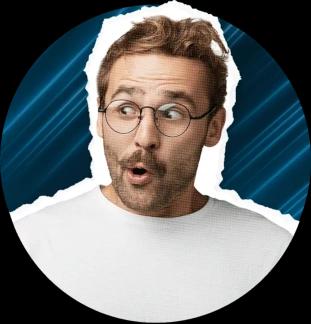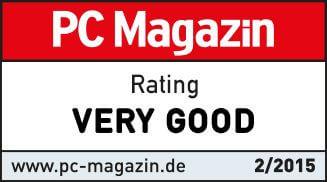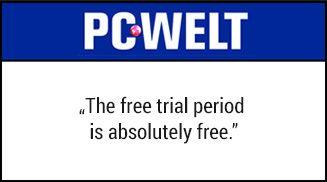Trivia from 30 years of Usenet
Trivia and interesting facts from over 30 years of Usenet history
Since the Usenet developed more than 30 years ago, a lot has changed: More than 200,000 newsgroups and over 30,000 terabytes of content which is growing by the day only serve to underline the popularity of the network. Did you know, for instance, that smileys or "Emoticons" originated in the Usenet? Or that the commonly used computer expression "LOL" was coined for the first time in the Usenet in 1990? Find out more about these and other interesting facts relating to the Usenet in our trivia section!
Try USENEXT for free
Get secure access now and discover the huge world of Usenet. A world just for your taste.

Beginning of the Usenet
1981
1. Newsgroup
The first newsgroup in 1981 was called "NET.general". Although the Usenet was created as an alternative to the military network Arpanet, this group was not a discussion platform about military topics (despite what the name "general" might suggest), it was a group for discussing IT and computers. Nevertheless, the group had plenty of material for discussion. It wasn't the content, but the mixed upper and lower case spelling in the title which users did not like. Shortly after, the group was renamed net.general to make it simpler.
First online discussion
In March 1982 the first online discussion was held regarding the music channel MTV founded at the end of 1981. The participants discussed whether the "Simon and Garfunkel" concert broadcast was really live or whether it was being replayed.
Smileys in the Usenet
"Smileys" or "Emoticons" were first used in the early Usenet. The character combinations :-) and :-( were invented in September 1982 by Scott Fahlman from Carnegie Mellon University. A group of computer scientists, who were increasingly communicating with each other via Usenet newsgroups, were looking for „joke markers“ in an effort to avoid misunderstandings due to sarcastic or humorously intended messages. These messages were to be marked directly with a symbol. Since then, smileys have established themselves as an irreplaceable part of the modern world. They have been developed in numerous variations and are now used virtually everywhere to give text a humorous touch or to visualise the current mood.
1982
1985
Rumours about the Coca Cola recipe
In April 1985 Usenet was the first place where rumours surfaced that Coca Cola had changed its recipe. Rumours like this have been going round for years. In 2011, Coca Cola celebrated its 125th birthday and its recipe remains absolutely secret and is safely stored in a safe in Atlanta. Up to now, nobody has been able to truly identify all ingredients or prove any changes to the original recipe.
Information source on Chernobyl
In April 1986 the Usenet served as a platform for exchanging information shortly after the nuclear meltdown in Chernobyl between worried Usenet users in the USA and users in Europe. This allowed first-hand information to be passed on. Even today, the Usenet newsgroups are still used as a platform for discussing the latest news with people around the world.
1986
1990
Birth of the expression “LOL”
The expression "LOL" (laughing out loud) was used for the first time in a newsgroup discussion in June 1990. Over the past 20+ years, the abbreviation has established itself in spoken and written language to such an extent that the standard work "Oxford English Dictionary" even admitted it in March 2011. Since 1990, multiple variations such as the emphasised "LOLOLOLOLOL" or "ROFL" (rolling on the floor laughing) have emerged.
Linus Torvalds announces LINUX
In 1991 Helsinki-based Linus Benedict Torvalds was working on a way of connecting his computer with the largest UNIX server of his university. Soon he noticed that the program he had developed had turned into an independent operating system thanks to his constant additions. In Oktober 1991, he announced the release of this free operating system in the Usenet newsgroup comp.os.minix and offered all interested users access to it. The Usenet community reacted by providing suggestions, ideas and wishes which Linus Torvalds subsequently integrated into the software. In other words, the help and feedback of the vast Usenet community played a decisive role in making Linux what it is today.
1991
1994
World's first spam
Even before the first popularisation of email services, American law firm "Canter & Siegel" started the first wave of spam for commercial purposes in 1994. The firm posted in all newsgroups for its services relating to the green card lottery with the advertising message "Green Card Lottery - Final one?". By sending this message, the firm paved the way for the development of an entire spam movement. Nowadays, spam emails make up 97% of the total online email volume.
Usenet on the "Simpsons
In September 1995, the Usenet celebrated a mention in the successful TV show "The Simpsons". In the episode entitled "Radioactive Man", the Comic Book Guy looks for information in the newsgroup alt.nerd.obsessive. This group was intended as a parody of the actual existing newsgroup on all topics relating to the Simpsons: alt.tv.simpsons. Since May 1997 the group alt.nerd.obsessive actually exists! The User "Polar bear" set it up as a platform for all "Usenet nerds" to meet up with Simpsons fans to discuss all possible "nerdy" topics.
1995
2004
The Usenet enters the Internet
In 2004, Google launched "Google Groups". It originally consisted of 845 million articles which the group either took over from the insolvent Usenet operator Deja News or from other collections. Since then, the number of articles has been growing daily. Google Groups is now the only freely accessible Usenet archive for the public where it is possible to view all text newsgroups articles. Access to binary files is only possible via Usenet providers.
Become a part of the Usenet community and write the history of our times together with millions of others. Discover the Usenet today!
Today
Questions concerning USENEXT?
If you have any questions concerning USENEXT, our support team will be glad to help you. Simply call our support hotline.
Call us:
0049 89 / 20 17 20 16
Online-Support

What others say about USENEXT

